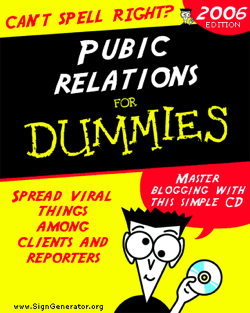
the craft as a bona fide segment of the journalism agenda.
It was not always that way, however.
During my undergraduate years at the University of Florida — in the early 1940s — the JM 201 textbook attitude toward public relations was reflected in the following cavalier treatment in its chapter on public relations:
The grizzled vet slid onto a stool at the Busy Bee diner, next to a newly hired cub reporter and selected the 35 cent blue plate special.
When the waitress brought their orders, he noticed that the young reporter was served a minute steak with a side of asparagus — in those Depression-era times a lavish lunch, indeed.
“Ah-ha,” he exclaimed, nodding sagely, “doing publicity on the sly!”
Today, the public relations department at the University of Florida’s College of Journalism, where we sponsor a PR scholarship, is on a level with the college’s journalism, broadcasting and advertising departments, demonstrating the recognition the discipline has achieved.